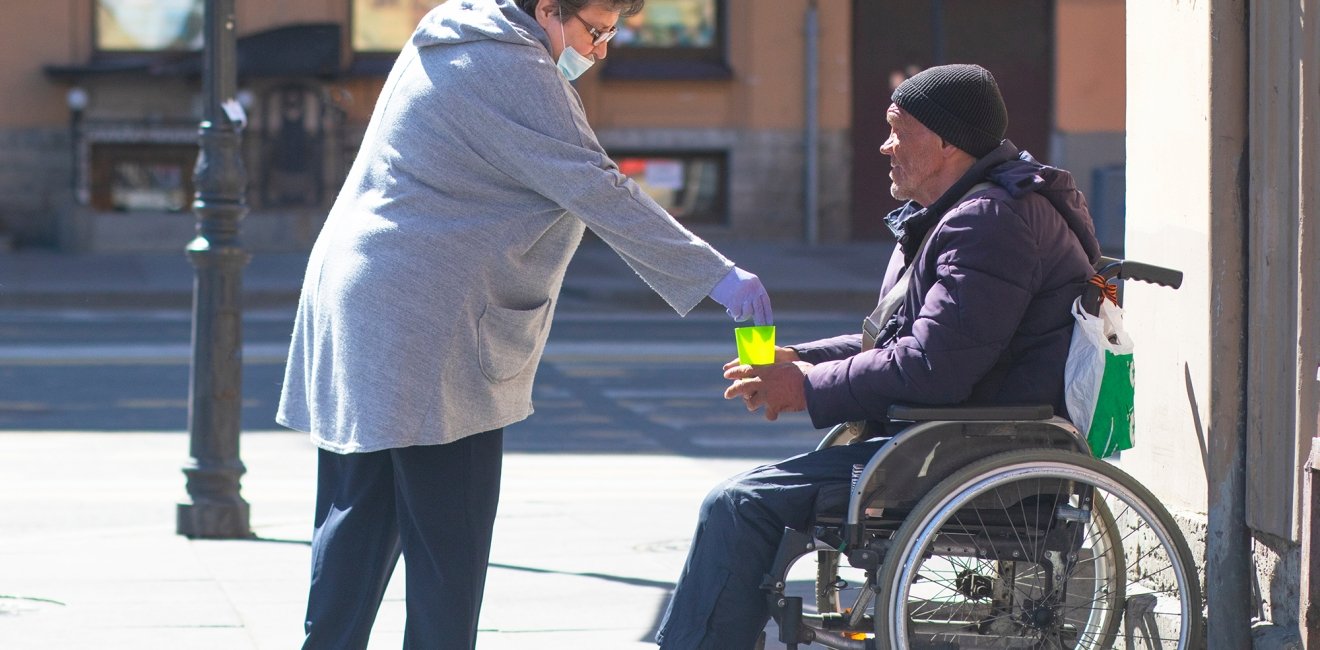
A blog of the Kennan Institute
BY NINA ROZHANOVSKAYA
The COVID-19 pandemic has tested not just health care systems but also civil societies across the globe. Russia’s relatively young civil society and relatively small nonprofit sector have not been spared. Indeed, they have had to work under the additional burdens of recent unfavorable legislation affecting donations and ongoing regional limitations on the movement of people.
As of 2017, Russia counted approximately 224,500 registered NGOs, including more than 140,000 “socially oriented” ones, but these represent only 1.1 percent of the national workforce—proportionally about ten times less than in the United States. With the coronavirus pandemic, many NGOs are at risk of closing. Yet some of the more vulnerable groups of the Russian population depend on them now more than ever: people with disabilities, migrant workers, orphaned children, inmates, the homeless, the elderly. Among the few bright spots is that, despite facing uncertainty over their own financial future, Russian citizens are donating more to charities than before the pandemic erupted.
The NGOs need all the help they can get. Though President Putin lifted the Russian nationwide lockdown (“nonworking” period) starting May 12, the regional restrictions remain. Forced to limit or cease face-to-face contacts with clients, confronting dwindling donations and increasing costs of imported medical equipment and medication, struggling to do their regular work under highly irregular circumstances, Russian nonprofits nonetheless remain on the COVID front lines, providing help in various shapes and forms.
Nochlezhka (Homeless Shelter) called on the residents of St. Petersburg to assist in its efforts to inform the homeless about COVID-19 by distributing leaflets and to donate face masks and antiseptic gels for the NGO to hand out to its clients. It also encouraged fellow citizens to join the You Are Not Alone campaign and leave plastic bags with food and hygiene products in places where homeless people could find them. Another NGO, Dom Druzey (House of Friends), is arranging temporary accommodation for the homeless in Moscow hostels.
Agora International Human Rights Group, an association of lawyers working on human rights cases, has opened a helpline to provide consultations on legal matters related to the pandemic, such as fighting fines issued for breaching lockdown, forced hospitalization, freedom of speech violations, and the like.
Anton Tut Ryadom (Anton’s Right Here), which helps adults with autism spectrum disorder, has adapted to the new circumstances by launching a meal delivery service, Kukhnya Tut Ryadom (Kitchen’s Right Here). This gives the center’s students an opportunity to practice their cooking skills to satisfy the needs of self-isolating customers and help local doctors who are fighting the coronavirus, while the proceeds will help sustain the center and make sure the students have a place to go during and after the pandemic.
These are just a few examples of how Russian nonprofits are responding to the new reality. With a variety of strategies and initiatives, it is not surprising that Novaya Gazeta called NGOs and volunteers a “rapid response” system that is more efficient than the Ministry of Civil Defense, Emergencies and Disaster Relief. However, even though nonprofit organizations are not giving up in the face of the coronavirus, they are certainly struggling. According to a March survey of 230 Russian NGOs, 28 percent of them (and almost half of the Moscow-based respondents) fear the loss of some of their funding.
“Saving those who are saving us” is the slogan of the fundraising campaign launched by the Nuzhna Pomoshch (Help Needed) foundation to address this problem. According to its director, Mitya Aleshkovskiy, without a major joint effort, the pandemic will lead Russia not just to a “great depression” but also to a “serious social disaster.” The campaign was launched on April 1 with the support of Russian celebrities and civil society leaders, and by April 6 individual donors had already signed up for 2.5 million rubles’ worth of monthly donations (around US $35,000) to support 216 charities.
Another lifeline was thrown by Russian billionaire and philanthropist Vladimir Potanin, who donated one billion rubles (around US $14 million) to “support the nonprofit sector in times of global instability.” From March through September 2020, the Potanin Foundation is accepting applications and awarding grants to cultural and social projects. The two kinds of grants are intended to help NGOs adapt to new challenges and “prevent long-term consequences of the pandemic for NGOs operating … in high-risk areas and with the most vulnerable groups.”
Civil society has also appealed to the government for help. On April 30, after a month of national lockdown, President Vladimir Putin announced a set of support measures for social NGOs similar to those that had already been announced for small and medium-sized businesses, namely, tax and rent deferrals, as well as wage subsidies and preferential loans. He also suggested allocating three billion rubles (around US $42 million) to support social NGOs actively involved in fighting the coronavirus pandemic, and adopting a clause on profit tax deductions for charitable donations of goods and food products. Less than three weeks after Putin’s announcement, the government introduced draft legislation on Tax Code amendments, and on May 22 the bill successfully passed the lower house of the Russian parliament.
Once approved by the upper house and signed by the president, the new legislation will provide several forms of tax relief to citizens, businesses, and nonprofits. Especially welcome is the provision making money and property contributions to certain charities tax-deductible. The registry of “socially oriented” NGOs that were affected by the pandemic and qualify for support under the new law is to be put together by June 5, but the bill explicitly prioritizes recipients of various government grants, subsidies, and contracts, as well as religious organizations. Despite its selective approach, the new legislative initiative represents major progress, as the country’s nonprofit sector has been lobbying for the reintroduction of tax deductions in one form or another since 2005, when they were abolished for fear of tax evasion schemes. Mitya Aleshkovskiy, the director of Nuzhna Pomoshch, called the adoption of this provision a “tectonic shift” and a “giant victory for civil society” that will change the Russian social landscape and save lives by encouraging more businesses to contribute to charity.
Another piece of good news is that, contrary to the expectations of charities, and despite their own financial struggles, Russian citizens are now donating more to organizations helping vulnerable people. Relying on data from more than 600 social nonprofits collected by the Nuzhna Pomoshch foundation and Yandex.Money online payment service, Kommersant newspaper reported that in March, these NGOs received 37 percent more in online donations compared to February and that April saw an increase by another 38 percent. Moreover, the average April donation was 1,021 rubles (around US $14)—the highest figure recorded over the past eighteen months.
Amid the pandemic, many new volunteer initiatives are emerging in Russia to help fellow citizens and support physicians, and concerned citizens are choosing to engage in philanthropy despite their own financial uncertainty. For some of the people involved in the new grassroots projects it will be the first practical lesson in solidarity in a time of crisis. For some, it may even become a life-changing experience that will draw them to charity work. A few temporary projects may even convert to long-term initiatives reaching beyond the effects of the current pandemic.
However, ad hoc volunteering to alleviate the consequences of disasters and emergencies cannot replace the long-term sustainable efforts of charity foundations and social NGOs to assist the vulnerable and the unprotected on a regular basis. Saving the Russian nonprofit sector now would mean saving Russian society from the hard work of rebuilding that indispensable safety net from scratch.
The opinions expressed in this article are those solely of the author and do not reflect the views of the Kennan Institute.
Author


Kennan Institute
After more than 50 years as a vital part of the Wilson Center legacy, the Kennan Institute has become an independent think tank. You can find the current website for the Kennan Institute at kennaninstitute.org. Please look for future announcements about partnership activities between the Wilson Center and the Kennan Institute at Wilson Center Press Room. The Wilson Center is proud of its historic connection to the Kennan Institute and looks forward to supporting its activities as an independent center of knowledge. The Kennan Institute is committed to improving American understanding of Russia, Ukraine, Central Asia, the South Caucasus, and the surrounding region through research and exchange. Read more

Explore More in The Russia File
Browse The Russia File
Chechnya as a Model of Modern Russia

Russia’s Indigenous Communities and the War in Ukraine

Gas and Power in a Changing US–Russia Relationship

